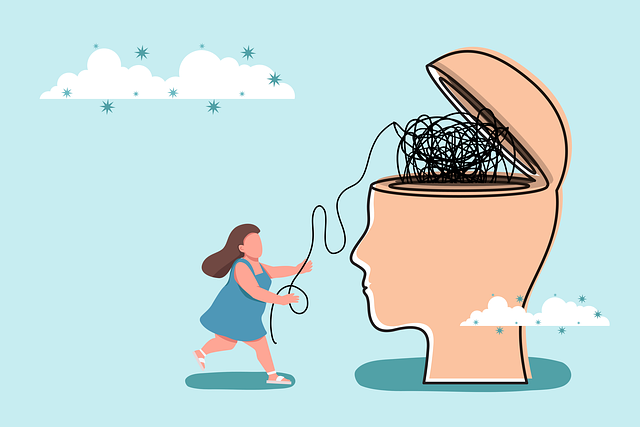Boulder French Speaking Therapy offers a unique, personalized approach to emotional well-being, focusing on coping skills development for effective stress management and adversity overcoming. Through compassion cultivation techniques, mindfulness practices, and cultural sensitivity, individuals gain tools to enhance resilience, navigate life's challenges, and promote lasting emotional growth. This holistic method includes Mental Health Policy Analysis advocacy, empowering clients to understand and advocate for their well-being within social systems.
Coping skills are essential tools for navigating life’s challenges. This article explores their profound significance in managing stress, anxiety, and emotional distress. We delve into the therapeutic benefits of Boulder French Speaking Therapy, which offers unique insights into developing effective coping strategies tailored to individual needs. Through understanding personal coping styles and strengths, individuals can enhance resilience and overall well-being. Additionally, practical techniques are provided for integrating coping skills into daily life.
- Understanding Coping Skills and Their Significance
- The Role of Boulder French Speaking Therapy in Developing Coping Strategies
- Identifying Personal Coping Styles and Strengths
- Practical Techniques for Enhancing Coping Skills in Daily Life
Understanding Coping Skills and Their Significance

Coping skills are the strategies we use to navigate life’s challenges and maintain emotional well-being. They play a pivotal role in our ability to handle stress, overcome adversity, and promote resilience. In the context of Boulder French-speaking therapy, understanding these skills is essential for personal growth and overall mental health. Therapy sessions often incorporate compassion cultivation practices and emotional well-being promotion techniques to help individuals develop effective coping mechanisms.
By learning and practicing these skills, people can manage their reactions to difficult situations, reduce anxiety relief, and foster a sense of calm. This proactive approach equips individuals with the tools needed to navigate life’s twists and turns, ensuring they emerge with enhanced emotional resilience and a deeper understanding of themselves.
The Role of Boulder French Speaking Therapy in Developing Coping Strategies

Boulder French Speaking Therapy plays a pivotal role in empowering individuals to navigate life’s challenges with resilience. Through its specialized approach, this therapy offers a unique space for emotional healing processes to unfold. The therapy recognizes that effective coping strategies are not one-size-fits-all; instead, it tailors sessions to accommodate the individual’s specific needs and cultural backgrounds, including those who speak French. This personalized touch is particularly beneficial in addressing burnout prevention, as it helps clients develop tailored mechanisms to manage stress and fatigue.
Moreover, Boulder French Speaking Therapy goes beyond mere coping skill development. It integrates insights from Mental Health Policy Analysis and Advocacy, ensuring that individuals not only gain practical tools for managing their mental health but also understand the broader social and systemic factors influencing their well-being. This holistic approach equips clients with the knowledge to advocate for themselves and others within the context of mental health policies, fostering a supportive environment for emotional recovery and growth.
Identifying Personal Coping Styles and Strengths

Understanding your personal coping styles is a powerful tool in navigating life’s challenges, especially when seeking support from a Boulder French-speaking therapy provider. Different individuals have unique ways of dealing with stress, anxiety, or difficult emotions. Some may prefer engaging in physical activities like exercise to release tension, while others find solace in creative outlets such as painting or writing. Identifying these personal coping mechanisms is the first step towards building resilience.
The process often involves self-reflection and may be facilitated by a healthcare provider with cultural competency training. They can guide individuals through exercises to assess their existing coping strategies, strengths, and areas that might require additional support. For example, a risk assessment for mental health professionals can help tailor interventions, ensuring anxiety relief methods are culturally sensitive and aligned with the client’s preferences, ultimately enhancing the therapeutic experience.
Practical Techniques for Enhancing Coping Skills in Daily Life

Developing strong coping skills is an essential aspect of well-being, and various practical techniques can be incorporated into daily routines to enhance resilience. One effective approach is incorporating mindfulness practices, such as meditation or deep breathing exercises, which help individuals stay grounded in the present moment, reducing anxiety and stress. These techniques are particularly beneficial for those seeking Boulder French speaking therapy, allowing them to engage with their emotions while maintaining cultural sensitivity in mental healthcare practice.
Additionally, building a supportive social network is crucial for coping. Encouraging open communication and fostering strong connections with friends and family can provide a safe space for sharing experiences and seeking support. Compassion cultivation practices, such as engaging in acts of kindness or keeping a gratitude journal, also contribute to emotional well-being by promoting self-care and empathy. These strategies collectively empower individuals to navigate life’s challenges with enhanced confidence and cultural sensitivity.
Coping skills development is a vital aspect of maintaining mental well-being, especially in today’s fast-paced world. By understanding and adopting effective strategies, individuals can navigate life’s challenges with resilience. The article has explored various approaches, including the valuable role of Boulder French Speaking Therapy, which offers tailored support for those seeking to enhance their coping abilities. Through identifying personal strengths and learning practical techniques, one can foster a robust toolkit for managing stress and adversity. Remember that developing these skills is an ongoing process, and consistently practicing self-care is key to long-term success.














